| |
TUTORIALS
IMPORTANT:
- The registration on the Conference includes the right to attend two (02) tutorials.
- Tutorials are totally free (there is no any extra payment to attend the tutorials).
- The participation in each tutorial will have the correspondent certification.
There are a limited number of vacancies for each tutorial, therefore, register as soon as possible.
In this URL you have to make your selection (you can do it only once… so, think about it before making your selection), before tomorrow Tuesday 3th (23:55 h. Peruvian Time): http://ucsp.edu.pe/latincom-registration/escoge_tutorial.php
If you have problems with your tutorial registration, please, write to ieeelatincom2015@ucsp.edu.pe.
Wednesday, 4th (Morning)
| Time & Location |
MORNING |
Time: 10:00 - 13:00 h.
Location: Main Auditorium |
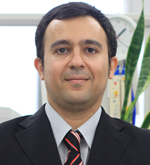  T1: Towards Energy-Efficient Hyper-Dense Wireless Networks with Trillions of Devices T1: Towards Energy-Efficient Hyper-Dense Wireless Networks with Trillions of Devices
Abolfazl Mehbodniya, Ph.D.
Tohoku University, Miyagi (Japan)
About the tutorial: A comprehensive knowledge of current trends and developments in wireless communications with a focus on hyper-dense systems which will be the pillar of next-generation wireless networks.
The challenges and design problems facing the introduction of sustainable, energy-efficient communication systems.
An overview on the state-of-the-art results and literature on HDHNs and the key roadmap for the future.
A comprehensive overview on innovative techniques, such as stochastic geometry and game theory, used in designing SON and radio resource management modules for HDHNs.
Future research directions and open problems in the area of energy-efficient HDHNs. |
Time: 10:00 - 13:00 h.
Location: Room PB-13 |
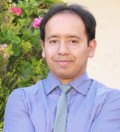  T2: Key Aspects in the Symbiosis of Analog and Digital Technologies Shaping Wireless Communication Systems T2: Key Aspects in the Symbiosis of Analog and Digital Technologies Shaping Wireless Communication Systems
Efraín Zenteno, Ph.D.
Universidad Católica San Pablo (Peru)
About the tutorial: This tutorial surveys the evolution of wireless communication systems from a historical perspective with emphasis on the analog and digital interplay and its future perspectives. We overview and analyze the trends in modern communication systems, from a capacity / deployment point of view and give insigths into the challenges and oportunities faced by the analog hardware and its digital counterpart in order to achieve enhanced network performance. Particularly, we higligth the emerging technologies proposed to cope with the network capacity increase, such as, MIMO, massive MIMO, spectrum sharing, small cells, between others, and reflect on the implications of these technologies on the hardware efficiency, cost and deployment. |
Time: 10:00 - 13:00 h.
Location: Room PB-08 |
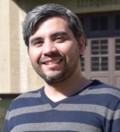  T3: Channel Estimation in Multicarrier Communication Systems – A System Identification Approach T3: Channel Estimation in Multicarrier Communication Systems – A System Identification Approach
Rodrigo Carvajal, Ph.D.
Universidad Técnica Federico Santa María (Chile)
About this tutorial: It is about the general problem of channel estimation in multicarrier (MC) communication systems, with a focus on mobile communications.
We will address the physical layer characteristics of LTE systems, the properties of the mobile radio propagation channel, and the characteristics and models of carrier frequency offset and phase noise in MC systems, and the effects they have on the received signals.
After that, we will address the problem of channel estimation in MC communication systems. This estimation problem, inter-alia, includes the joint estimation of channel noise variance, carrier frequency offset and phase noise bandwidth. In particular, we focus on Maximum Likelihood (ML) and Maximum a Posteriori (MAP) estimation, for which the Expectation-Maximization (EM) algorithm is considered. For MAP estimation, the prior terms are expressed as variance-mean Gaussian mixtures. In this case, the channel estimate can be obtained in closed form within the EM framework. It is also shown that the utilization of variance-mean Gaussian mixtures present a general method for MAP estimation, which encompasses different penalizations and optimization methods, such as the Lasso, Group-Lasso, and the lq-norm, among others.
Finally, it is also shown that the estimation of the channel noise variance is not straightforward, and that some modifications to the standard methods should be considered. It is shown that, in the proposed MAP estimation approach, those modifications can be included in a simple manner. |
Time: 10:00 - 13:00 h.
Location: Laboratory of High Frequency, Signals and Data (Lab. AFSD) |
 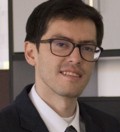 T4: Introduction to the Reconfigurable Networking Hardware Platform, NetFPGA T4: Introduction to the Reconfigurable Networking Hardware Platform, NetFPGA
R. Boris Martínez
Universidad Católica San Pablo (Peru)
About this tutorial: To give an introduction to handle the NetFPGA platform in order to perform the different packages available in the web.
To make basic changes and get a better handle the platform for later to be able to make their own models according to their research topic. The NetFPGA can be also used as a teaching tool, researchers and teachers involved with teaching of networking and computing can benefit with managing this card. |
Wednesday, 4th (afternoon)
| Time & Location |
AFTERNOON |
Time: 15:00 - 18:00 h.
Location: Main Auditorium |
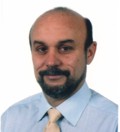  T5: Clouds, Network Virtualization and Big Data T5: Clouds, Network Virtualization and Big Data
Nelson Fonseca, Ph.D.
UNICAMP (Brazil)
About this tutorial: In this tutorial we will introduce the Big Data ecosystem (fundamentals, state of the art, technologies, etc.) and research challenges with emphasis on current networking technology. |
Time: 15:30 – 18:00 h.
Location: Awning at gardens (Toldo jardines) |
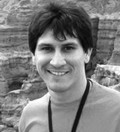  T6: Diameter Constrained Reliability and its Impact in Network Design T6: Diameter Constrained Reliability and its Impact in Network Design
Pablo Romero, Ph.D.
Universidad de la República (Uruguay)
About this tutorial: Computer Science naturally deals with optimization, search and recognition problems. However, reliability analysis does not fall into the previous classification. The classical reliability problem is to find the connectedness probability of a random graph. However, in several real-life applications, a hop constraint is essential (video-streaming applications, cooperative environments, degraded systems). The diameter-constrained reliability has been introduced in 2001, inspired in delay-sensitive applications over the Internet infrastructure,
In this tutorial, we study the computational complexity of the diameter-constrained reliability, and its impact in topological network design. |
Time: 14:30 - 16:45 h.
Location: Room 108 |
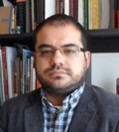  T7: Review of Internet of Things T7: Review of Internet of Things
Gustavo A. Ramírez, Ph.D.
Universidad del Cauca (Colombia)
About this tutorial: It has been 10 years since ITU in a report, talks about a promise of a world of devices interconnected that provide relevant content to user, it was call Internet of Things, there have been several proposal for the implementation of this possibility. Now ten years later this concept is surround us. This tutorial make a review and demonstrations of the most important technologies and mechanisms that enable this promise, since RFID in its raw basis to the sophisticated options of his fashionable NFC alternative; since the basic management of raw data and sensor to IoT searching mechanisms nowadays. |
Time: 16:00 - 18:15 h.
Location: Laboratory C (Lab. C) |
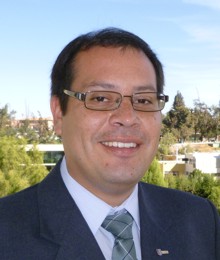  T8: Handling Software Defined Radio: A Guide to Universal Software Radio Peripheral T8: Handling Software Defined Radio: A Guide to Universal Software Radio Peripheral
Ebert San Román, M.Sc., et al.
Universidad Católica San Pablo (Peru)
About this tutorial: In this tutorial we will give a practical introduction to the handling of software defined radio. In order to achieve this goal, we will provide a practical guide (in the laboratory) to the programming of the Universal Software Radio Peripheral (USRP).
This technology is really important in these moment, especially to applications in which multiple radio interfaces, with different frequencies and modulations have to interact. |
|
< |
GENERAL PROGRAM >>
SESSION PROGRAM >>
KEYNOTE SPEAKERS >>
TUTORIALS >>
|